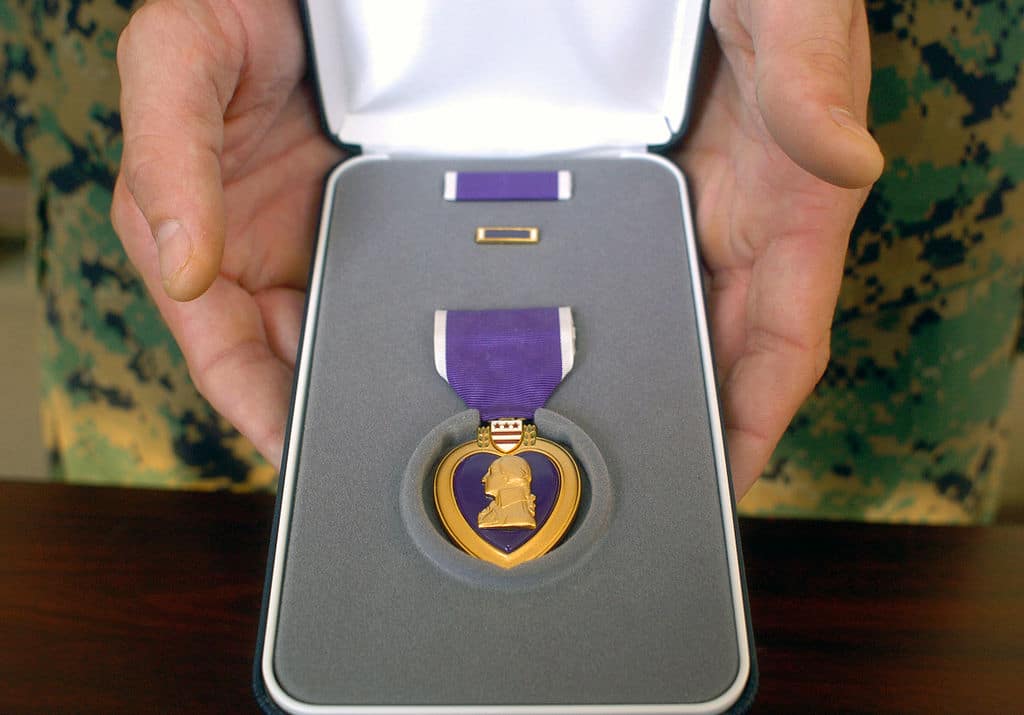Butenas, who served in Company E, 23rd Infantry Regiment, Second Division, was posthumously awarded the Purple Heart for wounds received in action on July 18, 1918, in France, when he was 24 years old.
On Thursday, Butenas’ family was presented with a medal that he never received himself. Butenas died in October 1962 at age 68 and was interred at St. Catherine’s Cemetery in Broad Brook.
Janeczko said getting Butenas the recognition he deserved was a long, complicated, and uncertain process, fueled in part by a fire that destroyed a large swath of military personnel records.
He said the search began years ago, when he became interested in his grandfather’s history. He said he obtained a copy of Butenas’ medical records, but they lacked many important details that he remembered.
“I knew he had lost sight in one eye during the war,” Janeczko said. “He never had a Purple Heart, no medals.”
The Purple Heart is the oldest military award still given to members of the U.S. military. Originally called the Badge of Military Merit, the first three were given out by General George Washington during the Revolutionary War. All three men — Daniel Bissell of Windsor, Elijah Churchill of Newington, and William Brown of Stamford — were from Connecticut.
When the U.S. military reinstated awarding the Purple Heart to service members in 1932, it was given to those wounded or killed while serving on or after April 5, 1917.
—
East Hartford dealership building CT’s first Porsche facility
—
Somers community comes together at fundraiser for fire victims
Janeczko said when he learned that the Purple Heart medal applied retroactively to some World War I veterans, he reached out to U.S. Sen. Richard Blumenthal’s office to get help in recognizing his grandfather’s service.
Janeczko said neither he nor Blumenthal’s office had much luck until he found an old, yellowed piece of paper detailing Butenas’ service, including when and with whom he served, which battles he participated in, and wounds he received during his service.
“No pun intended, but this was the smoking gun,” Janeczko said.
The process moved along quickly once the records were found, Janeczko said, allowing his grandfather get the recognition he deserved over a century after he was wounded.
Soldiers like Butenas had to come home and go back to “regular” life after the war, Janeczko said, despite their injuries and hardships.
“They had to come home and raise a family, then the Depression started,” he said.
Janeczko said Butenas was chiefly a farmer, but took on other tasks including building furniture for his neighbors.
“I appreciate everything he did,” Janeczko said.
Janeczko said he was glad that so many people who did not know Butenas were interested enough in his story to attend the ceremony.
Ernie Teixeira, honorary member of the East Windsor Veterans Commission, said he was glad to see an East Windsor veteran being recognized, and that he knows first-hand how proud Janeczko is of his family.
“It’s a good honor to have this,” Teixeira said.
Blumenthal said Butenas was an example of leadership, service, and sacrifice.
“It’s because of heroes like Anthony Butenas that we are safer and more secure as a nation,” Blumenthal said.
East Windsor First Selectman Jason Bowsza said the ceremony would not have happened without the “steadfast advocacy” of Janeczko. “While it’s a little delayed, we’re here to do the right thing,” Bowsza said.
State Rep. Jaime Foster, D-Ellington, said it is difficult to fathom the conditions soldiers faced during World War I. “Now this day and age, as we see conflicts around the world, we know the importance of bearing witness,” Foster said.
Janeczko said his grandfather was, essentially, handed a rifle and a uniform and fast-tracked to the battlefield.
“It was a whole different war,” he said. “There was very little training, very little equipment.”
Blumenthal said after the war, Butenas suffered from lasting effects of trench foot, mustard gas, and partial blindness.
“There was nothing like the VA health system we have now … he truly deserved this recognition while he was alive,” Blumenthal said.

